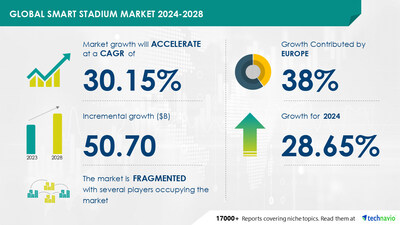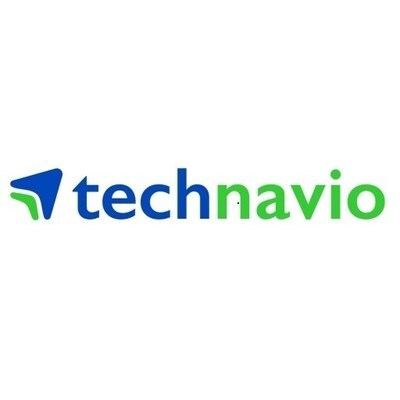Smart Stadium Market size is set to grow by USD 50.70 billion from 2024-2028, Improved operational efficiency to boost the market growth, Technavio
Press Releases
May 23, 2024
NEW YORK, May 23, 2024 /PRNewswire/ — The global smart stadium market size is estimated to grow by USD 50.70 billion from 2024-2028, according to Technavio. The market is estimated to grow at a CAGR of almost 30.15% during the forecast period.
For more insights on the forecast market size and historic data (2018 – 2022) – Download Free sample report in minutes
|
Forecast period |
2024-2028 |
|
Base Year |
2023 |
|
Historic Data |
2018 – 2022 |
|
Segment Covered |
Software (Digital content management, Building automation, Stadium and public security, Event management, and Others), Deployment (On-premises and Cloud-based), and Geography (Europe, North America, APAC, South America, and Middle East and Africa) |
|
Region Covered |
Europe, North America, APAC, South America, and Middle East and Africa |
|
Key companies profiled |
Avaya LLC, Cisco Systems Inc., DB Schenker, Dell Technologies Inc., Dignia Systems Ltd., GP Smart Stadium, Hawk Eye Innovations Ltd., Hewlett Packard Enterprise Co., Honeywell International Inc., Huawei Technologies Co. Ltd., Infosys Ltd., Intel Corp., International Business Machines Corp., Johnson Controls International Plc, Lumen Technologies Inc., NEC Corp., Nippon Telegraph and Telephone Corp., Telefonaktiebolaget LM Ericsson, Weblib, and DS worldwide Ltd. |
Key Market Trends Fueling Growth
The smart stadium market is experiencing significant growth, with augmented reality (AR) becoming an integral part of the sports domain. Spectators can enhance their experience by downloading AR applications on their devices, accessing player statistics, referee decisions, and action replays. AR also benefits stadium management through online auctions and merchandise sales, increasing revenue.
Key technologies include 5G, AI, big data, cloud segment, IT infrastructure, security standards, and digital signage. Stadium operators must ensure network security, privacy, and data breach prevention. Additionally, VR and AR technologies offer new business prospects for professional leagues, sponsors, and athletes.
Market Challenges
- The smart stadium market faces substantial investment for digitization, primarily due to infrastructure upgrades. This includes purchasing hardware such as Wi-Fi, distributed antenna systems, and interactive displays, as well as building management software and enterprise resource planning systems. Implementations of imaging technology, metal detection, AI, and surveillance solutions are also necessary.
- The costs of these upgrades, along with maintenance, can reach millions of dollars. Low event frequency prolongs the return on investment timeline. Key features include parking solutions, sensors, wireless and wired networks, fan experience enhancements, security systems, and services like ticket management and seat upgrades.
- Additionally, smart stadiums incorporate digital signs, stadium apps, online merchandise, food ordering, live streams, and lockdown protocols. Integration of IT resources, cloud technology, and augmented reality further enhances the fan experience. Smart lighting, parking space management, and sustainable infrastructure are also essential components. Smart building automation and space utilization complete the digital transformation of stadiums.
Research report provides comprehensive data on impact of trend, driver and challenges – Download Free sample report in minutes
Segment Overview
- Software
- 1.1 Digital content management
- 1.2 Building automation
- 1.3 Stadium and public security
- 1.4 Event management
- 1.5 Others
- Deployment
- 2.1 On-premises
- 2.2 Cloud-based
- Geography
- 3.1 Europe
- 3.2 North America
- 3.3 APAC
- 3.4 South America
- 3.5 Middle East and Africa
1.1 Digital content management- In the software market segment of smart stadiums, various solutions are employed to enhance the fan experience and ensure security compliance. Imaging and metal detection technologies are utilized for crowd management and security checks. Artificial intelligence implementation in surveillance solutions improves safety and efficiency. Sports events are augmented with digital signs for advertisements and spectator information.
Parking solutions are facilitated through sensors and wireless networks, while wired networks support IT resources and cloud technology for services like online merchandise, food ordering, and live streams. Fan satisfaction is prioritized through stadium apps, self-driving cars, and telecommunications. Healthcare and manufacturing industries also benefit from digital transformation in stadium infrastructure.
Sustainable infrastructure and smart building automation optimize space utilization. The services segment includes integrated security systems and sustainable solutions like smart lighting and lockdown protocols. Evolv Technology and Acrisure Stadium are pioneers in implementing these advanced technologies, revolutionizing the fan experience while adhering to security norms.
For more information on market segmentation with geographical analysis including forecast (2024-2028) and historic data (2018 – 2022) – Download a Sample Report
Research Analysis
The Smart Stadium Market is experiencing significant growth due to the integration of advanced technologies such as 5G, Virtual Reality (VR), and Augmented Reality (AR). Stadium operators are leveraging these technologies to enhance the fan experience at sports events. Integrated technologies like Surveillance solutions, Digital signs, and Parking solutions are being implemented to improve efficiency and convenience.
Sensors and Wireless networks are crucial for managing seating capacity, ticket prices, and athlete performance data. The use of IT in the sports industry is transforming professional leagues like the NFL into smart stadiums, providing business prospects for sponsors and attracting sports fans. The implementation of these technologies is revolutionizing the smart stadium industry, offering innovative solutions for stadium management and operations.
Market Research Overview
The Smart Stadium market is experiencing significant growth due to the integration of technology into sports and entertainment venues. Technologies such as Wi-Fi, beacons, RFID, and IoT are transforming the way stadiums operate. These technologies enable contactless ticketing, real-time fan engagement, personalized marketing, and optimized facility management. The use of big data analytics helps stadiums gain insights into fan behavior and preferences, enabling them to offer customized experiences.
The integration of augmented reality and virtual reality technologies enhances the fan experience by providing immersive and interactive experiences. The implementation of security technologies ensures the safety and security of fans and staff. The market for Smart Stadiums is expected to continue growing as technology continues to evolve and stadiums strive to offer more engaging and convenient experiences for fans.
Table of Contents:
1 Executive Summary
2 Market Landscape
3 Market Sizing
4 Historic Market Size
5 Five Forces Analysis
6 Market Segmentation
- Software
- Digital Content Management
- Building Automation
- Stadium And Public Security
- Event Management
- Others
- Deployment
- On-premises
- Cloud-based
- Geography
- Europe
- North America
- APAC
- South America
- Middle East And Africa
7 Customer Landscape
8 Geographic Landscape
9 Drivers, Challenges, and Trends
10 Company Landscape
11 Company Analysis
12 Appendix
About Technavio
Technavio is a leading global technology research and advisory company. Their research and analysis focuses on emerging market trends and provides actionable insights to help businesses identify market opportunities and develop effective strategies to optimize their market positions.
With over 500 specialized analysts, Technavio’s report library consists of more than 17,000 reports and counting, covering 800 technologies, spanning across 50 countries. Their client base consists of enterprises of all sizes, including more than 100 Fortune 500 companies. This growing client base relies on Technavio’s comprehensive coverage, extensive research, and actionable market insights to identify opportunities in existing and potential markets and assess their competitive positions within changing market scenarios.
Contacts
Technavio Research
Jesse Maida
Media & Marketing Executive
US: +1 844 364 1100
UK: +44 203 893 3200
Email: [email protected]
Website: www.technavio.com/
![]() View original content to download multimedia:https://www.prnewswire.com/news-releases/smart-stadium-market-size-is-set-to-grow-by-usd-50-70-billion-from-2024-2028–improved-operational-efficiency-to-boost-the-market-growth-technavio-302152857.html
View original content to download multimedia:https://www.prnewswire.com/news-releases/smart-stadium-market-size-is-set-to-grow-by-usd-50-70-billion-from-2024-2028–improved-operational-efficiency-to-boost-the-market-growth-technavio-302152857.html
SOURCE Technavio




